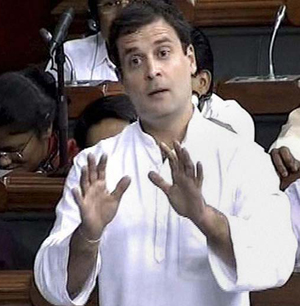New Delhi, Dec 1: Rahul Gandhi today launched a scathing attack on the Government on the issue of intolerance telling it not to learn the "wrong lessons" from Pakistan and pleaded that it should listen to the people who have been "disturbed" over recent incidents.
"People like Narayana Murthy, Raghuram Rajan and P M Bhargava are among the many protesting... They are disturbed like millions of other people. Respect them and try to understand what is disturbing them. Go and listen to them," he said speaking on the debate of intolerance in the Lok Sabha.
The Congress Vice President's speech was repeatedly interrupted by BJP members, especially when he targeted Union Minister V K Singh who, he alleged, had likened two Dalit children in Haryana who were burnt to dogs to dogs. This was strongly contested by the BJP members. The Minister was not present in the House.
"Our Prime Minister allowed this man to continue as Minister. Ambedkar spent his entire life ....and wrote the Constitution so that the two children are not burnt. The Prime Minister is unable to see this contradiction," he said amid cries of 'shame-shame' from the Opposition benches.
"I request Government, please do not learn the wrong lessons from Pakistan. Be tolerant. Listen to your people, embrace your own people. Mahatma Gandhi gave voice to the people.
"Pakistan became a failure because their leaders crushed voices of their people...were intolerant. Let us not learn the wrong lessons," he said.
Gandhi regretted that the Prime Minister remained silent after the Dadri lynching incident despite the fact that the son of the person killed is an air force personnel. "The ultimate responsibility for his protection is with the Prime Minister who remained silent", he remarked.






Comments
Add new comment